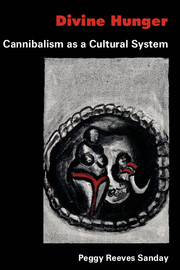Book contents
- Frontmatter
- Contents
- Preface
- Acknowledgments
- Introduction
- The symbols that give rise to a cannibalistic consciousness
- The mythical chartering and transformation of cannibal practice
- 6 The faces of the soul's desires: Iroquoian torture and cannibalism in the seventeenth century
- 7 Raw women and cooked men: Fijian cannibalism in the nineteenth century
- 8 Precious eagle-cactus fruit: Aztec human sacrifice
- 9 The transformation and end of cannibal practice
- 10 Conclusion: Other symbols and ritual modalities
- Notes
- References
- Index
9 - The transformation and end of cannibal practice
Published online by Cambridge University Press: 05 June 2012
- Frontmatter
- Contents
- Preface
- Acknowledgments
- Introduction
- The symbols that give rise to a cannibalistic consciousness
- The mythical chartering and transformation of cannibal practice
- 6 The faces of the soul's desires: Iroquoian torture and cannibalism in the seventeenth century
- 7 Raw women and cooked men: Fijian cannibalism in the nineteenth century
- 8 Precious eagle-cactus fruit: Aztec human sacrifice
- 9 The transformation and end of cannibal practice
- 10 Conclusion: Other symbols and ritual modalities
- Notes
- References
- Index
Summary
They came back, they returned and settled near Tewara. They turned into stones; they stand in the sea. One of them cast her eyes on Dobu, this is Murumweyri'a; she eats men, and the Dobuans are cannibals. The other one, Kayguremwo, does not eat men, and her face is turned towards Boyowa. The people of Boyowa do not eat man.
Myth of the Flying Canoe of Kudayuri, TrobriandsHe promoted a Modawa festival to attract the people out of the bush and back into the village, and when it was concluded after a year he distributed food and pigs among the whole of Nibita. He told the people that fighting and cannibalism must finish; that henceforth they must fight only with food.
From a condensation of Kalanuna, Goodenough Islands, folk-historyIs [there not] a possible religion of life, a religion of love? … In the famous myth of the primal murder, Freud encounters an episode that remains unexplained, although it is ultimately the pivot of the drama: this episode is the forming of the covenant among the brothers whereby they agreed not to repeat among themselves the murder of the father. This covenant is highly significant, for it puts an end to a repetition of the act of parricide; by prohibiting fratricide, the covenant engenders a history. […]
- Type
- Chapter
- Information
- Divine HungerCannibalism as a Cultural System, pp. 196 - 213Publisher: Cambridge University PressPrint publication year: 1986



